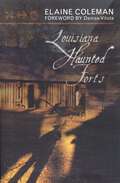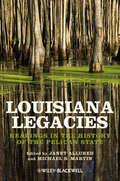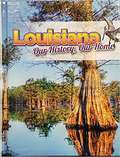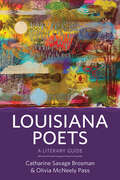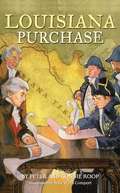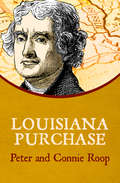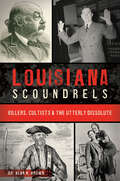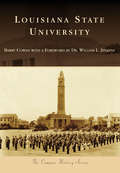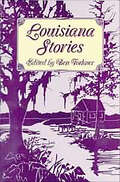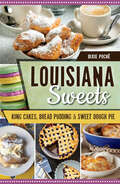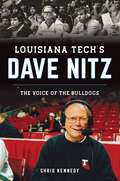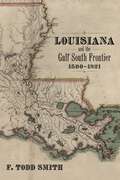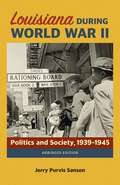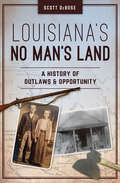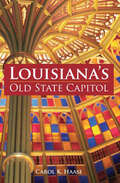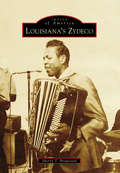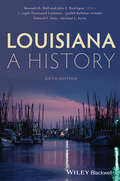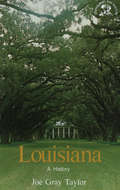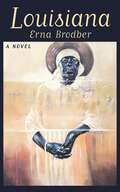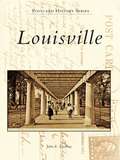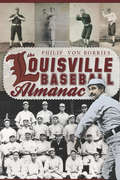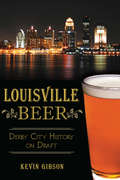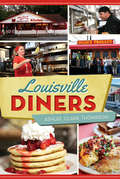- Table View
- List View
Louisiana Haunted Forts
by Elaine ColemanAlthough there are numerous books about Louisiana, little information about the forts are included and none combines the forts with ghost stories. Louisiana has five distinct regions, and all have historic forts, ranging from French rule to Spanish, Confederate, Federal, and even Privateer. Each unique story is heightened by ghostly legends. The state is already a strong tourist attraction with a $5.2 billion business yearly, 87,000 employees in tourism, and a population of over 4,000,000.
Louisiana Legacies: Readings in the History of the Pelican State (Coursesmart Ser.)
by Janet Allured Michael S. MartinShowcasing the colorful, even raucous, political, social, and unique cultural qualities of Louisiana history, this new collection of essays features the finest and latest scholarship. Includes readings featuring recent scholarship that expand on traditional historical accounts Includes material on every region of Louisiana Covers a wide range of fields, including social, environmental, and economic history Detailed, focused material on different areas in Louisiana history, including women’s history as well as the state’s diverse ethnic populations
Louisiana Poets: A Literary Guide
by Catharine Savage Brosman Olivia McNeely PassLouisiana has long been recognized for its production of talented writers, and its poets in particular have shined. From the early poetry of the state to the work crafted in the present day, Louisiana has nurtured and exported a rich and diverse poetic tradition. In Louisiana Poets: A Literary Guide authors Catharine Savage Brosman and Olivia McNeely Pass assess the achievements of Louisiana poets from the past hundred years who, Brosman and Pass assert, deserve both public notice and careful critical examination.Louisiana Poets presents the careers and works of writers whose verse is closely connected to the peoples, history, and landscapes of Louisiana or whose upbringing or artistic development occurred in the state. Brosman and Pass chose poets based on the scope, abundance, and excellence of their work; their critical reception; and the local and national standing of the writer and work. The book treats a wide range of forty poets—from national bestsellers to local celebrities—detailing their histories and output.Intended to be of broad interest and easy to consult, Louisiana Poets showcases the corpus of Louisiana poetry alongside its current profile. Brosman and Pass have created a guide that provides a way for readers to discover, savor, and celebrate poets who have been inspired in and by the Pelican State.
Louisiana Purchase
by Peter Roop Connie RoopIn 1803 President Thomas Jefferson bought the Louisiana territory from the French for $15,000,000. The purchase made President Jefferson's dream of extending the U.S. west of the Mississippi River come true. Now the much larger United States had difficult questions to answer: How would Louisiana be governed? How would it be divided into states? Would those states be free states or slave states? What would happen to the Native Americans? It would take over one hundred years, a war over slavery, and the creation of thirteen new states before these questions could be answered.
Louisiana Purchase
by Peter Roop Connie RoopThe big purchase that led to fundamental questions about what America would become In 1803 President Thomas Jefferson bought the Louisiana Territory from the French for $15 million, extending the United States beyond the Mississippi River for the first time. Now the United States had big questions to answer: How would Louisiana be governed? How would it be divided? Would it be comprised of free states or slave states? What would happen to the Native Americans? With biographical sketches of the people who helped forge the answers to these questions, such as Lewis and Clark, Napoleon Bonaparte, and of course, Thomas Jefferson, this is the tale of the expansion of the United States into a new territory as well as a new era.
Louisiana Scoundrels: Killers, Cultists & the Utterly Dissolute
by Dr Alan N. BrownAuthor Alan Brown guides the intrepid on a dark tour of the Pelican State’s most infamous residents. Louisiana beckons those the world over with its culture and Spanish moss–draped beauty. But that magnetic pull has also summoned a cast of reprobates vile enough to fill a book. In this version of Louisiana, pirate Jean Lafitte and gentlemanly train robber Eugene Bunch go ahead and help themselves to whatever they like, murderous dentist Etienne De Champs is the stuff of dentophobic nightmares, a psychotic killer known as “The Axeman” stalks the streets of New Orleans and a hail of bullets greets Bonnie and Clyde. Indeed, the sadistic Delphine LaLaurie and Voodoo Queen Clementine Barnabet are quite comfortable in this decidedly non-moss-draped history.
Louisiana State University
by Dr William Jenkins Barry CowanLouisiana State University began in 1860 as a small, all-male military school near Pineville. The institution survived the Civil War, Reconstruction politics, and budgetary difficulties to become a nationally and internationally recognized leader in research and teaching. A devastating fire destroyed the campus in 1869, and the school moved to Baton Rouge, where it has remained. Successive moves to larger campuses in 1887 and 1925 created greater opportunities in academics, student life, and athletics. Academics began with classical and engineering courses. New majors in the arts, literature, engineering, agriculture, and the sciences evolved, along with research in those fields. Student life changed from military regimentation to coeducation and students' freedom to live off campus and make their own decisions. Intercollegiate athletics began in 1893 with baseball and football games against Tulane, and the LSU Tigers have since won numerous championships. These evolutionary steps all helped to create Louisiana's flagship university.
Louisiana Stories
by Ben Forkner"An illuminating, and at the same time, thoroughly entertaining compilation, Louisiana Stories is enhanced by an introductory essay that is a contribution not only to the literary history of the state but also of the South." Lewis P. Simpson, former professor of English at Louisiana State University and editor of The Southern Review.Southern writers have always excelled in the short story form. Eudora Welty, Flannery O'Connor, and Peter Taylor are the yardsticks by which short story writers are judged not only within the realm of Southern literature but also within that of American literature. By compiling an impressive array of stories by many of the Deep South's finest writers, anthologist Ben Forkner demonstrates how Louisianans in particular have influenced the development of the short story. Forkner writes in his insightful introductory essay: "These same native Louisiana stories manage to announce the central themes of modern Southern fiction more emphatically, and earlier, than the writing of any other single Southern region."Included in this compilation are works by Henry Clay Lewis, George Washington Cable, Lafcadio Hearn, Grace King, Kate Chopin, William Faulkner, Lyle Saxon, Arna Bontemps, Zora Neale Hurston, E.P. O'Donnell, Shirley Ann Grau, Ernest Gaines, Andre Dubus, James Lee Burke, Robb Forman Dew, and John William Corrington.Ben Forkner is the director of the English department at the University of Angers in France where he teaches American and Irish literature. A graduate of Stetson University in Florida, he received his M.A. and Ph.D. from the University of North Carolina at Chapel Hill. He has co-edited three anthologies of Southern literature, Stories of the Modern South , AModern Southern Reader, and Stories of the Old South .
Louisiana Sweets: King Cakes, Bread Pudding, & Sweet Dough Pie (American Palate Ser.)
by Dixie PochéExplore the recipes and history behind an array of sweet treats from the Sugar State with help from the author of Classic Eateries of Cajun Country.Louisiana is famous for its culinary delights, and the state&’s rich medley of treats and confections proves its sweet tooth. Creative bakers improvised traditional recipes during days of rationing to create gateau de sirop (syrup cake) and bread pudding. Early customers of Lea&’s Lunchroom&’s pies in central Louisiana included outlaws Bonnie and Clyde, who dropped by while they were on the run. During the 1950s, singers Hank Williams Sr. and Elvis Presley hung out at Shreveport&’s Southern Maid Donuts after performing at the popular Louisiana Hayride country music broadcast. Author Dixie Poché dives into the recipes and history behind such beloved regional specialties as Mardi Gras king cake, flaming Bananas Foster, Cajun Country&’s pain perdu and many more.&“Desserts Past, Present, and Future are the stars of Dixie Poché&’s new book, Louisiana Sweets: King Cakes, Bread Pudding, and Sweet Dough Pie. The Lafayette-based travel writer gets rather Dickensian (but trade that tacky soot for powdered sugar) as she lays outs a picture of the state&’s love affair with sweets through history, anecdotes, recipes, restaurant profiles, and more.&” —Country Roads Magazine
Louisiana Tech's Dave Nitz: The Voice of the Bulldogs (Sports)
by Chris KennedyAuthor Christopher A. Kennedy shares the story of the Voice of the Bulldogs. Dave Nitz was the voice of Louisiana Tech University sports for half a century, his distinctive voice emanating from Tech fans’ radios. A West Virginia native, Nitz dreamed of broadcasting in the big leagues. Little did he know that his Hall of Fame broadcasting career would take him to Ruston, Louisiana. Along the way, Nitz worked with country music icon Tom T. Hall in West Virginia and covered William & Mary University football under Lou Holtz. At Tech, Nitz gave voice to the basketball greatness of Karl “The Mailman” Malone and the national champion Lady Techsters. He called gridiron action from Maxie Lambright through unforgettable upsets of Alabama and Michigan State. Author Christopher A. Kennedy shares the story of the Voice of the Bulldogs. As Nitz would say, “You gotta love it!”
Louisiana and the Gulf South Frontier, 1500-1821
by F. Todd SmithBound together by social, demographic, and economic commonalities, the territory extending from East Texas to West Florida occupies a unique space in early American history. A masterful synthesis of two decades of scholarly work, F. Todd Smith's Louisiana and the Gulf South Frontier, 1500-1821 examines the region's history from the eve of European colonization to the final imposition of American hegemony.The agricultural richness of the Gulf Coast gave rise to an extraordinarily diverse society: development of food crops rendered local indigenous groups wealthier and more powerful than their counterparts in New England and the West, and white demand for plantation slave labor produced a disproportionately large black population compared to other parts of the country. European settlers were a heterogeneous mix as well, creating a multinational blend of cultures and religions that did not exist on the largely Anglo-Protestant Atlantic Coast.Because of this diversity, which allowed no single group to gain primacy over the rest, Smith's study characterizes the Gulf South as a frontier from the sixteenth century to the early years of the nineteenth. Only in the twenty years following the Louisiana Purchase did Americans manage to remove most of the Indian tribes, overwhelm Louisiana's French Creoles numerically and politically, and impose a racial system in accordance with the rest of the Deep South.Moving fluently across the boundaries of colonial possessions and state lines, Louisiana and the Gulf South Frontier, 1500-1821 is a comprehensive and highly readable overview of the Gulf Coast's distinctive and enthralling history.
Louisiana during World War II: Politics and Society, 1939–1945
by Jerry Purvis SansonWhile the impact of World War II on America and other countries has been exhaustively chronicled, few historians have investigated the experiences of individual states during the tumultuous war years. In his study of Louisiana’s home front from 1939 to 1945, Jerry Purvis Sanson examines changes in politics, education, agriculture, industry, and society that forever altered the Pelican State. The war era was a particularly important time in Louisiana’s colorful political history. The gubernatorial victories of prominent anti–Huey Long candidates Sam Jones in 1940 and Jimmie Davis in 1944 reflected shifting sentiments toward politicians and heralded a changing of the guard in the statehouse. This created a system of active dual-faction politics that continued for the next decade. The war also transformed the state’s economy: agricultural mechanization accelerated to compensate for labor shortages, and industries increased production to meet military demands. Louisiana’s educational system modified its curriculum in response to the war, providing technical training and sponsoring scrap-metal collections and war-stamp sales drives. Sanson explores the war’s effect on the everyday lives of Louisianians, showing how their actions at home provided them with a sense of personal participation in the titanic effort against the Axis powers. He also points out that, while many found their lives limited by war, two groups—African Americans and women— experienced increased opportunities as they moved from low-paying jobs to more lucrative positions vacated by white males who had departed for the service. Now condensed for easy and efficient access, Sanson’s historical account provides a wide-ranging yet intimate look at how the war was brought home to the people of the Bayou State.
Louisiana's No Man's Land: A History of Outlaws and Opportunity (The History Press)
by Scott DeBoseJoin author Scott DeBose on a rugged journey through Louisiana's No Man's Land. Most Americans know the basics of the Louisiana Purchase, but few know that West Louisiana was left out of the purchase. They also don't know that in 1806, the United States and Spain almost went to war over the boundary, and it was only an agreement negotiated by the American and Spanish commanders that prevented full scale war. But it wasn't out of patriotism that James Wilkinson, commanding general of the US Army, negotiated the agreement. He was not only a Spanish Spy, but he was involved in Aaron Burr's conspiracy. America now had a 40-mile wide and roughly 500-mile-long strip of land they could not station troops or police, and outlaws soon flocked to the region. This book will tell the story of how No Man's Land was created, the conspiracy behind its creation, the outlaws, smugglers, and pirates who used the region as a base (such as Jean Lafite, Jim Bowie and John Murrell "The Reverend Devil"). But it wasn't all outlaws--those folks will get their due, as well.
Louisiana's Old State Capitol
by Carol K. Haase"Stunning . . . a strikingly impressive memoir. A magically whimsical examination, a wide-ranging assortment, and a remarkable collection of full-bodied, all encompassing detail . . . a powerful tribute to the structure and all who dwelled within its walls." -Mary Louise Prudhomme, executive director, Louisiana Old State Capitol"Carol Haase has captured the spirit of the Old State Capitol. Her insight into the fascinating history of this building enables the reader to view the Old State Capitol as a long-lost friend who has encountered countless difficulties but managed to survive over the years." -Jay Dardenne, Louisiana secretary of state Overlooking the Mississippi River in Baton Rouge, Louisiana, a Gothic-style castle stands out in dignity among neighboring buildings. Despite the elegant architecture with impressive turrets, stained-glass windows, and pitched gables, this remarkable structure is more than bricks and iron. The first Louisiana state house is a lasting reminder of what the building once symbolized: the hope for prosperity. During Louisiana's seminal years, the location of the state capital was the cause of fiery disputes. Originally located in New Orleans, it was relocated to Donaldsonville and eventually moved to Baton Rouge. On October 26, 1847, Baton Rougeans broke ground, commencing the capitol's construction. Over a century the Old State Capitol and surrounding landscapes have withstood fires, Union control during the Civil War, economic depression, and hurricanes. It served as a venue to galas in support of WWI troops, rallies promoting women's suffrage, and the inauguration of nineteen Louisiana governors. Although it was replaced by the new state capitol building in 1932, the magnificence of the structure remains, serving as a public museum.
Louisiana's Zydeco
by Sherry T. BroussardThe bayou sings and the trees sway with the untold stories of many unsung heroes, including Louisiana's amazing Zydeco musicians. The music is an extraordinary blend of the accordion, the bass and electric guitars, the drums, the rub or scrub board, and other instruments. It tells stories about finding and losing love, life lessons, and other revelatory events that rise from the skillful hands of musicians playing the diatonic and piano accordions. The diverse population of Louisiana creates a rich culture with Zydeco festivals, Creole foods, and the unique music that fills the air with a foot-stomping beat like no other. Louisiana's Zydeco is a snapshot of some of the many musicians who live and play the homegrown music known as Zydeco.
Louisiana: A History
by Light Townsend Cummins Edward F. Haas Judith Kelleher Schafer Michael L. KurtzCovering the lively, even raucous, history of Louisiana from before First Contact through the Elections of 2012, this sixth edition of the classic Louisiana history survey provides an engaging and comprehensive narrative of what is arguably America’s most colorful state. Since the appearance of the first edition of this classic text in 1984, Louisiana: A History has remained the best-loved and most highly regarded college-level survey of Louisiana on the market Compiled by some of the foremost experts in the field of Louisiana history who combine their own research with recent historical discoveries Includes complete coverage of the most recent events in political and environmental history, including the continued aftermath of Katrina and the 2010 BP oil spill Considers the interrelationship between Louisiana history and that of the American South and the nation as a whole Written in an engaging and accessible style complemented by more than a hundred photographs and maps
Louisiana: A History
by Joe Gray Taylor<P> From the earliest colonists through the latest Mardi Gras, Louisiana has had a history as exotic as that of any state. Even its political corruption--extending from French governors for whom office was exploitable property through the "Louisiana Hayride" following the death of Huey Long--seems to have had a glamorous side. <P> Handing the colony of Louisiana back and forth between their empires, the French and Spanish left a legacy that lives in such forms as the architecture of the Vieux Carre and a civil law deriving from the Napoleonic Code. Acadian refugees, German farmers, black slaves and free blacks, along with Italians, Irish, and the "Kaintucks" who helped Andrew Jackson win the Battle of New Orleans added to the state's distinctiveness. Made rich by sugar cane, cotton, and Mississippi River commerce before the Civil War, Louisiana faced poverty afterward. Battles between Bourbon Democrats and Reconstruction Republicans followed, ultimately involving the Custom House Ring and the Knights of the White Camelia. By methods that remain controversial, Huey Long ended "government by gentlemen" with economic transformations other had sought. Gas, oil, and industrialization have additionally "Americanized" the state. <P> Something of Louisiana's historic joie de vivre remains, however, to the gratification of residents and visitors alike; both will enjoy Joe Gray Taylor's telling of the story.
Louisiana: A Novel
by Erna BrodberThis is the first American publication of Brodber's eagerly awaited third novel. In Louisiana: A Novel she explores her continuing fascination with the power of the past to live in the present. Here, Ella Townsend, a young African American anthropologist whose roots are Caribbean, researches Louisiana folklife and discovers not only the world of voodoo and carnival but also the mystical connection of the living and the dead. With her tape recorder she explores the rich heritage of Creole Louisiana, but Mammy, Ella's primary informant, dies during the project. Then from beyond the grave she continues to transmit messages. Although the academically minded Ella is dubious about the authenticity of the medium, gradually, as she confronts her prejudices, the tapes convey enriching mysteries about the past lives of Mammy and her friend Lowly. From this supernatural experience, Ella learns much about herself and her background. Louisiana celebrates the magico-religious culture of hoodoo, conjure, obeah, and myal. Like Brodber's previous works, Myal: A Novel and Jane and Louisa Will Soon Come Home, Louisiana reveals the author's fascinating gift of myth-making. The Louisiana of her title represents two places sharing the same name—the American state and Brodber's native parish in Jamaica. Through this blending of localities, Brodber shows how elements from the African diaspora are kept alive in the Creole culture of the Americas.
Louisville (Postcard History)
by John FindlingFounded in 1778 as a portage point on the lower Ohio River, Louisville was closely tied to river commerce for a century. In the 1880s, the Southern Exposition and the growth of the Louisville and Nashville Railroad did much to establish the city as an important commercial link between the North and South. By 1900, Louisville was the 18th largest city in America, with a population of just over 200,000. The city had a vibrant downtown with elegant office buildings and hotels and one of the finest park systems in the country, designed by the Olmsted brothers in the 1890s. In Louisville, more than 200 postcards present a visual record of the institutions, prosperity, and charm of the river city.
Louisville Baseball Almanac, The (Sports)
by Philip Von BorriesThough long associated with fine bourbons, riverboats and champion Thoroughbreds, Louisville, Kentucky, is home to another icon--the Louisville slugger. The Louisville Baseball Almanac presents the first-ever comprehensive look at the rich history of professional teams, ballplayers and managers, a history that runs deep within the city. Originally a major-league city that won a pennant in 1890, the early Louisville teams gave rise to a host of legends and eccentrics, in equal measure. And ever since, Louisville has maintained a strong position in baseball history as a top-flight minor league city. Red Sox, Yankee, Dodger, Reds and Cardinals fans--baseball fans --have Louisville to thank for launching the careers of some of the game's most memorable players. Louisville baseball historian Philip Von Borries recounts the breadth of Louisville's ballplaying heritage, his text complemented by numerous vintage photographs.
Louisville Beer: Derby City History on Draft (American Palate)
by Kevin GibsonIt's no secret that Louisville is one of America's bourbon capitals, but the Derby City once thrived as a brewing mecca as well, rivaling even St. Louis and Milwaukee with its crisp lagers and Kentucky Common Ale. German settlers arrived with centuries-old brewing traditions and beer gardens, cementing beer and barrooms in Louisville's culture. Following Prohibition, the "big three"--Falls City, Fehr's and Oertel's--kept traditions alive while ingraining iconic brands into the city's fabric and heritage. More recently, craft brewers like BBC, Apocalypse Brew Works and New Albanian Brewing Company have drawn on this rich history. Kick back with Louisville food and beverage journalist Kevin Gibson as he traces Louisville's beer history with stories from the past, interviews and plenty of photos that bring this intoxicating story to life.
Louisville Diners (American Palate)
by Ashlee Clark ThompsonLouisville boasts many award-winning fine dining restaurants, but long before Derby City mastered upscale cuisine, it perfected the diner. Explore Louisville's tasty offerings with local food writer Ashlee Clark Thompson as she surveys the city's impressive variety of greasy spoons from the Highlands to the West End and everywhere in between. Enjoy home cooking done right at Shirley Mae's Café and Bar, breakfast at Barbara Lee's Kitchen, lunch to go at Ollie's Trolley and so much more. Packed with insightful interviews and helpful tips that only a local can provide, Louisville Diners is a delectable look into the best the city has to offer.
